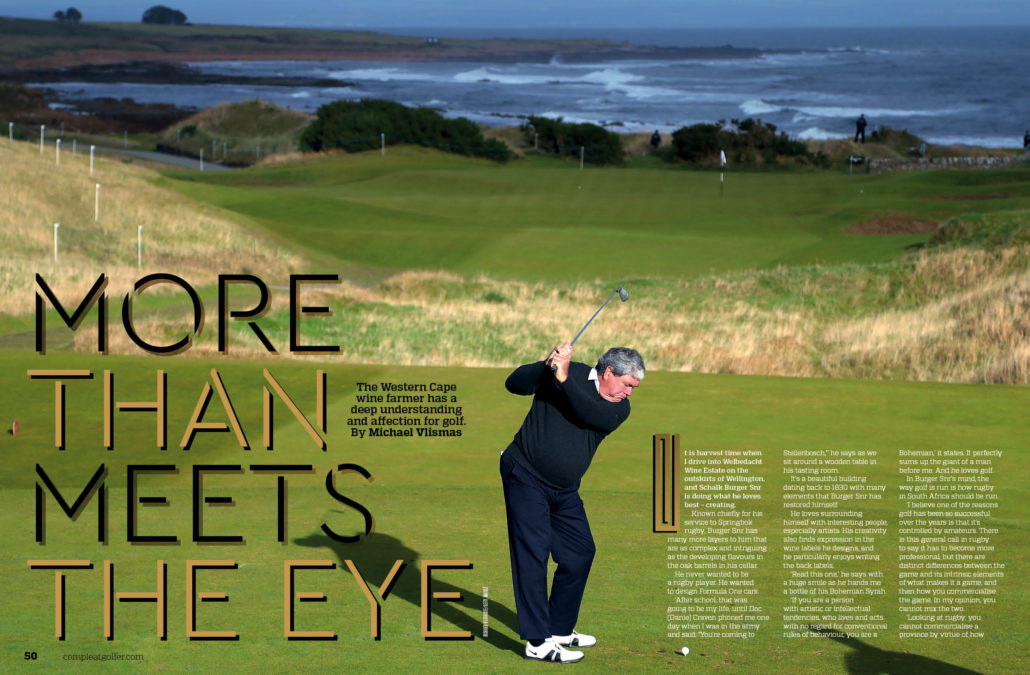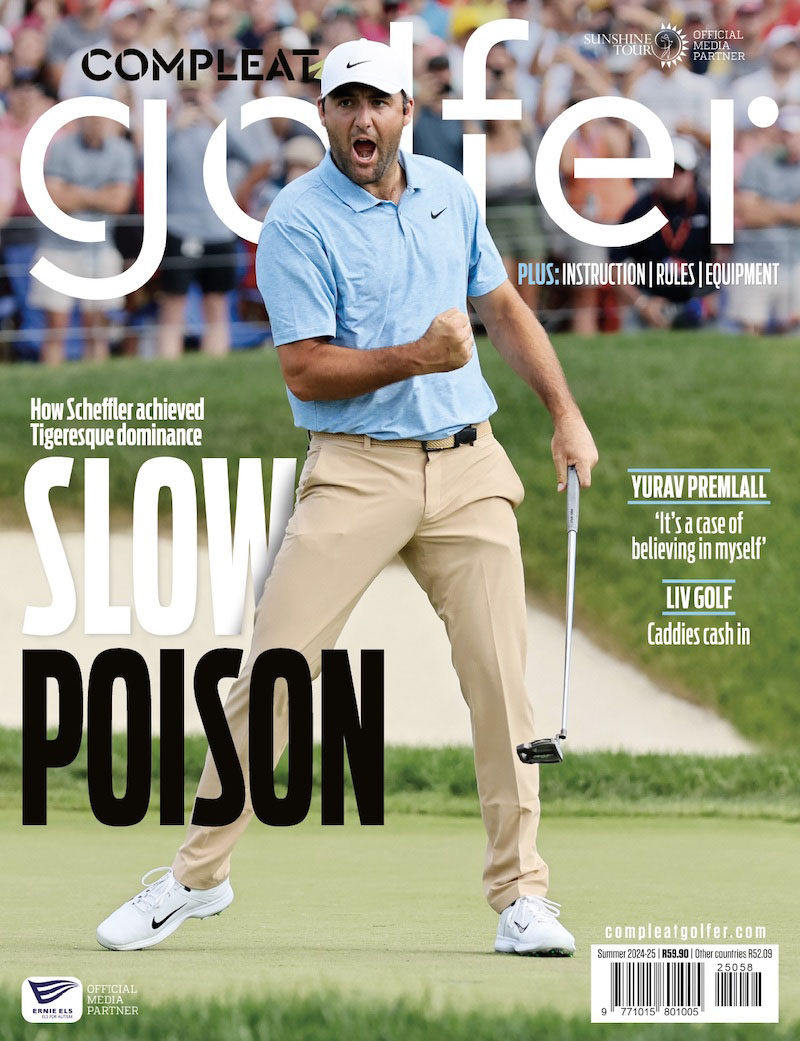Western Cape wine farmer Schalk Burger Snr has a deep understanding and affection for golf, writes MICHAEL VLISMAS.
It is harvest time when I drive into the Welbedacht Wine Estate on the outskirts of Wellington, and Schalk Burger Snr is doing what he loves best – creating.
Known chiefly for his service to Springbok rugby, Burger Snr has many more layers to him as complex and intriguing as the developing flavours in the oak barrels in his cellar.
He never wanted to be a rugby player. He wanted to design Formula One cars.
‘After school, that was going to be my life, until Doc [Danie] Craven phoned me one day when I was in the army and said, “You’re coming to Stellenbosch,”’ he says, as we sit around a wooden table in his tasting room.
It’s a beautiful building dating back to 1830, with many elements that Burger Snr has restored himself.
He loves surrounding himself with interesting people, especially artists. His creativity also finds expression in the wine labels he designs, and he particularly enjoys composing the back labels.
‘Read this one,’ he says with a huge smile as he hands me a bottle of his Bohemian Syrah.
‘If you are a person with artistic or intellectual tendencies, who lives and acts with no regard for conventional rules of behaviour, you are a Bohemian,’ it states. It perfectly sums up the giant of a man before me. And he loves golf.
In Burger Snr’s mind, the way golf is run, is how rugby in South Africa should be run.
‘I believe one of the reasons golf has been so successful over the years is that it’s controlled by amateurs. There is this general call in rugby to say it has to become more professional, but there are distinct differences between the game and the intrinsic elements of what makes it a game, and then how you commercialise the game. In my opinion, you cannot mix the two.
‘Looking at rugby, you cannot commercialise a province by virtue of how it’s constituted. The players constitute the clubs, the clubs constitute the province and the provinces constitute the national body. So you are either professional or you aren’t. You can’t be half professional. You cannot have 50% professional ownership of a union and the other 50% is owned by amateurs. It doesn’t work.
‘Golf is controlled by the R&A and USGA, two amateur bodies who govern its rules. They do so in the interests of golf. They serve golf, golf does not serve them. Then you have golf as a business.
‘In rugby, we have paid officials making rules. It isn’t in the interests of rugby. I think rugby needs an R&A.’
He also believes rugby players could learn from golfers when it comes to appreciating their earning potential.
‘Golf is probably one of the most brutal games. For every golfer who makes it, there must be a few thousand who don’t. What a lot of rugby players don’t appreciate, is the conversion of money relative to performance. The rugby player has all his expenses paid for, while the golfer still has to pay his expenses and make the cut before earning anything. That’s the competitive nature of golf.’
Burger Snr admits he was a late developer when it came to golf, but once he discovered the game at the age of 24 he became passionate about it.
‘I told my children there are only three sports you have to do – fishing, hunting and golf. Fishing and hunting because they are the two oldest sports in the world. And golf because it teaches you how to play against yourself before you play against somebody else.
‘I love the game and everything it stands for.’
A member of Wellington Golf Club since 1987, Burger Snr came tantalisingly close to his finest golf moment there a few years ago when he was one shot off the lead at the open as he approached the stroke one.
‘I was about a four- or five-handicap then. Then I made 10 on the stroke one. So I know all about being in reverse gear in this game, with a foot on the pedal and going backwards very quickly,’ he says.
‘My kids [Schalk, Tiaan and Rene] all learned to play there. Schalk was a very good golfer. He was four and a half when he made his first birdie on the par-three 8th hole at Wellington – a little 2-iron and then drained the putt. He could’ve become a golfer. He hits the ball far, but has a very nice touch with chipping and putting. Tiaan is also a good golfer. And my daughter, Rene, on her fourth or fifth time she played golf at Montagu at Fancourt, on the second nine she shot a 39. She could’ve been the best.’
Some of his fondest golf memories of his children are the times they’d each pick a club and then have a competition, hitting shots over the house, aiming at a variety of targets, including the wheel of the sightscreen that’s on the cricket pitch on the farm.
As for his own golf, Burger Snr has been privileged to play around the world, and he often tees it up at the Alfred Dunhill Links Championship in St Andrews.
‘I’ve played most of the top courses in Scotland. I love Carnoustie and St Andrews, and Kingsbarns and Loch Lomond are beautiful. I’ve been privileged to play nine or 10 rounds at Augusta National.
‘Another great experience last year was playing Seminole and playing for Leopard Creek against the Seminole members. I had to win my match to halve the game. I did so with a par on the 18th, and in a big wind coming off the sea. Those are serious golfers. I think everybody we played against had a handicap of eight or lower.
‘In the Bahamas, Albany, which Ernie Els built, is another great course. But then you’ve also got Lyford Cay, which is a wonderful course for the community there.
‘In South Africa I love Leopard Creek; I’m a member there. But I also like Montagu, East London Golf Club and Durban Country Club. I adore Humewood, especially in the wind. And Joburg has some wonderful courses.’
Burger Snr also shares close friendships with Sunshine Tour golfers, many of whom have stayed with him during tournaments, going back to the days when Derek James still played the circuit.
‘I’ll never forget, there was a Winter Tour event in Paarl and Derek was playing in it. Schalk was about nine or 10, and Derek was teasing him and jinking past him saying, “You can’t even tackle me”. So eventually Schalk tackles Derek and dislocates Derek’s toe the morning he has to play, and he’s leading the tournament. He went out and shot a course record with a dislocated toe. He was hobbling around and said he was too ashamed to tell everyone a young kid did that to him.’
As we walk through his wine cellar, which he designed himself, Burger relates how farming teaches you that you can only make the best of what the land has given you. It’s a lesson every golfer should also take to heart.
‘I love any course. I’m not a big moaner about a golf course. For 25 years I’ve been going to the Karoo Classic in Victoria West, where we play on browns. I don’t mind where I play. I just love the game of golf.
‘The course is the same for everybody and you’ve got to adapt your game and work it out. I think too many golfers these days don’t work it out. They force themselves on the course, and the course is just there. Hit two or three clubs extra if you have to. Don’t get it stuck in your head that at 160 I hit this club.’
As he’s also taught his children, it’s a philosophy that mirrors life too.
‘I’ve always told my kids to never be afraid of making mistakes, but control the risk. You can’t force yourself on to life. You’ve got a certain set of morals and life takes you in a direction. You have the high and low road, and you decide which you’ll take. Too many people these days try to change the playing field.’
The winemaker interrupts us with a question, and Burger has to attend to the many things a harvest demands. Then there is also preparation for a cricket match on his oval the following day, as well as a visit by a group of European buyers.
But the man with the big hands is quite comfortable juggling the myriad interests in his life amid the aroma of the pinotage grapes fermenting in his cellar.
– This article first appeared in the March 2017 issue of Compleat Golfer magazine








